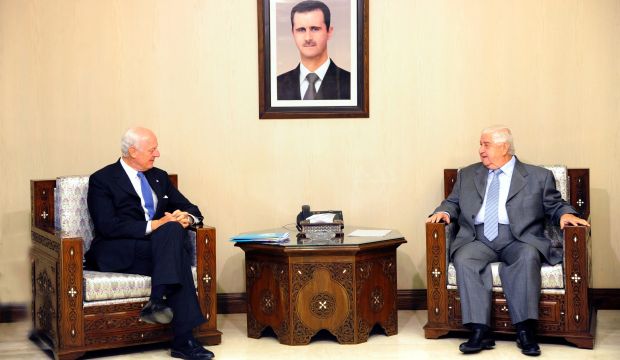
Syrian Foreign Minister Walid Al-Mouallem (R) meeting with UN Syria envoy Staffan de Mistura (L) in Damascus, Syria, on November 9, 2014. (EPA/SANA HANDOUT)
Samir Nashar told Asharq Al-Awsat Khatib had made the visit, which included meetings with Russian Foreign Minister Sergey Lavrov and other Russian officials, without consulting with the current head of the Coalition, Hadi Al-Bahra, or its government’s prime minister, Ahmad Tu’mah. The delegation which had accompanied Khatib to the Russian capital nonetheless included three members of the current opposition government, he added.
Nashar said the move had “angered” Prime Minister Tu’mah and other members of the Coalition, especially given that there have been reports—as yet unconfirmed—that the meetings in Moscow had also included Syrian security officials loyal to President Bashar Al-Assad.
Khatib sparked controversy last February, when he was still leader of the Coalition, when he said that he would be “willing to hold direct meetings” with members of the Assad regime in order to “ease the burdens of the Syrian people”—though he had made this conditional upon the release of political prisoners.
Speaking to a Syrian opposition website on Saturday, Khatib said the visit to Moscow came as a result of an invitation from Russian officials, and that the meetings with Lavrov, which he described as “positive,” had centered around “finding a political solution” to the Syrian conflict and “mechanisms to secure the transfer of power,” while giving priority to putting an end to the bloodshed in the war-torn country.
He also said the meetings would act as catalysts for further meetings in Moscow, though he did not clarify when these would occur, nor their exact nature or whether they would include other members of the Coalition.
Khatib’s visit to the Russian capital coincided with that of Lebanese politician Walid Jumblatt, who also met with Foreign Minister Lavrov, with as-yet-unconfirmed reports suggesting he, Lavrov and Khatib had also held meetings together.
Jumblatt, who backs a political solution to the Syrian conflict and the removal of Assad, said he was accompanied on the visit by members of his Progressive Socialist Party.
Speaking of the conflict to the TASS Russian News Agency, Jumblatt said: “We must go back to the demands previously made [to Assad] by the Arab League, which include the retreat of the Syrian army from cities, the release of political prisoners . . . and putting on trial all those who have committed crimes against the Syrian people—including members of the interim [opposition] government.”
He added that following the transition of power in Syria, there would “no longer be any place for the head of the regime [Bashar Al-Assad] in the country.”
In addition to the Syrian conflict, Jumblatt said he also discussed with Lavrov the ongoing political crisis in Lebanon, which has been without a president since May, adding that Lavrov was keen to improve relations between the two countries and that he expected Lebanon would soon purchase weapons and military equipment from Russia.
Russia, along with Iran, is one of the only countries currently backing the embattled President Assad.
Within Syria, fighting continued over the weekend around the predominantly Kurdish city of Kobani, on the Syrian-Turkish border. The towns Kurdish defenders have been battling to hold back fighters from the Islamic State of Iraq and Syria (ISIS) since September, with the assistance of US airstrikes. Elsewhere, the Syrian government continued airstrikes against ISIS-held towns near Aleppo on Sunday, but reportedly lost territory to the Al-Qaeda linked Al-Nusra Front in southern Syria.
In an effort to find a way to halt the ongoing violence, the UN Special Envoy to Syria, Staffan de Mistuna, paid his second official visit to Damascus on Sunday, for talks with Syrian foreign minister Walid Al-Mouallem and other officials.
According to Syrian state media, the two men discussed a number of issues, including proposals for a series of local ceasefires in different areas of Syria, which Mistuna presented to the UN Security Council last month.

Trackbacks/Pingbacks